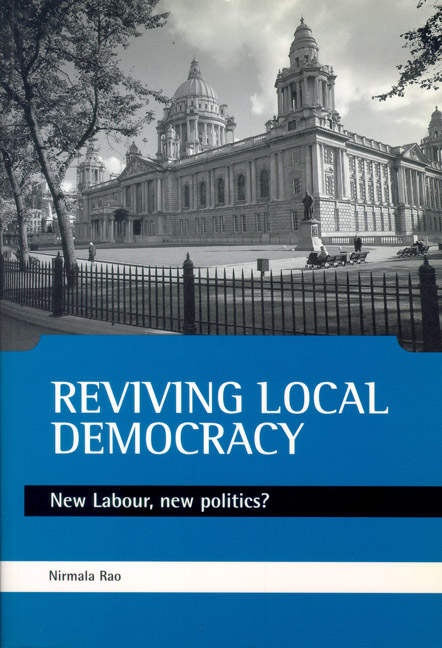Book contents
- Frontmatter
- Contents
- List of tables
- Acknowledgements
- one New times for local democracy
- two Local democracy and after
- three The failed promise of reform
- four Civic-minded Britain?
- five The reluctant voter
- six The third way and democratic reform
- seven The modernising agenda: enhancing participation
- eight The modernising agenda: new forms of political leadership
- nine Prospects for a new politics
- Bibliography
- Appendix A The surveys
- Appendix B The legislation
- Index
three - The failed promise of reform
Published online by Cambridge University Press: 05 July 2022
- Frontmatter
- Contents
- List of tables
- Acknowledgements
- one New times for local democracy
- two Local democracy and after
- three The failed promise of reform
- four Civic-minded Britain?
- five The reluctant voter
- six The third way and democratic reform
- seven The modernising agenda: enhancing participation
- eight The modernising agenda: new forms of political leadership
- nine Prospects for a new politics
- Bibliography
- Appendix A The surveys
- Appendix B The legislation
- Index
Summary
By the mid-1960s, astute observers had come to see local government as the victim of its own success. Services had expanded and expenditure risen, to the great satisfaction of many councillors and officials, but at the price of local authorities becoming the agents of central government. The gradual rise of central control and the corresponding loss of local autonomy had been neither anticipated nor desired. Recognition of the problem prompted a series of White Papers, published during the 1950s, and their culmination in the 1958 Local Government Act. However, these measures were too little, too late. Some commentators were convinced that the decline of local government's standing would be irreversible in the absence of more radical reform.
Thus, debates on wholesale reform came to dominate the 1960s. They focused on the need to renew local democracy by drawing on the services of community-conscious people who, until that point, had stood aloof from local affairs. A number of obstacles lay in that path, including social change, the increasing intrusion of party politics, the time demands of council service and the debilitating effects of centralisation itself. Most, although not all of these, could be addressed by structural change, accompanied by reform of the methods by which local authorities conducted their business.
So arose a new orthodoxy: that fewer, larger and more powerful local authorities would attract greater public interest and reverse the declining respect paid to councils and their councillors. Likewise, speedier and more effective decision making, conducted along business lines, would make local authorities more accountable and effective, and perhaps more attractive too. But more than structural change was required. If local democracy was to be renewed, the wider public had to become involved. Recognition of this point spawned a series of participatory initiatives designed to involve local people in the affairs of their councils. These initiatives, taken together, were intended to restore public confidence which, it was imagined, had been lost at some point between the 19th century and the present.
Whatever the effectiveness of these successive attempts to kick-start a revival of local democracy (generally limited, in most observers’ opinion), by the 1980s they were seen as irrelevant. Britain had entered an age of strident confrontation between central and local government, and between the contesting parties within local authorities.
- Type
- Chapter
- Information
- Reviving Local DemocracyNew Labour, New Politics?, pp. 29 - 66Publisher: Bristol University PressPrint publication year: 2000



